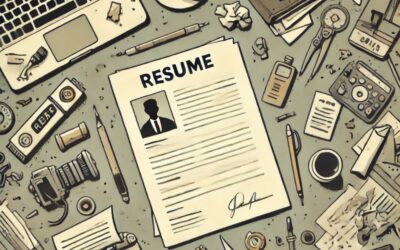Why you need this article
Many modern experts warn it’s old-fashioned to write “Please find attached my CV” in your cover letter. They say the recruiter will think Samuel Pepys is asking for a job.
But if you’re just looking for a less stilted way of saying the same thing, then you’re missing the point.
In this article, I’ll dig into the 3 main reasons we feel the need to mention our CV or resume at all. I’ll then explain why giving this phrase valuable white space isn’t a good idea, and finally, I’ll reveal how to link to your CV in a way that will boost the impact of your application and make you more attractive to employers and recruiters.
Why we say “please find attached my CV” – and why we shouldn’t
Most of us refer to our CV or resume in our cover letter for one of the following reasons:
- We think “Please find attached my CV” is standard procedure for a cover letter, so it gets in by default (the Lemming)
- We genuinely want to draw the recruiter’s attention to the presence of our CV or resume (the Foam Finger)
- We’re not completely sure our letter packs a big enough punch, so we want to add a little extra just in case (the Self-Soother)
So let’s break this down.
1. The Lemming
“Would you jump off a cliff if Bozzer told you to?”
(To be read in my mum’s voice, btw.)
For the record, I never did jump off a cliff. But I did hurtle in reverse on a skateboard down a very big hill, and lost the skin from my shoulder blades to my waist. Because Bozzer told me to, obviously.

Now, from what I gather about Bozzer these days, he’s unlikely to be offering much cover letter advice. But if he were still with us, he might counsel you to sign off your cover letter with a swish of your quill and this good old stock phrase.
If, unlike me, you prefer to keep the skin on your back, keep this key test at the forefront of your mind with every single thing you type:
Does this word, phrase or sentence:
- help me stand out from the competition for the right reasons
- hinder my efforts to shine
- sort of neither, maybe, perhaps
Defaults and templates can be useful, and of course there are accepted formalities. But this isn’t one of them.
At best, “Please find attached my CV” is just a waste of space. You’ve had a lucky escape if the recruiter’s eyes just glaze over and move on. If you’re less fortunate, your weary reader will give a tiny shake of their head and tag you with “meh”, or “tsk”, or “nope”.
The first thing to do is notice the Lemming. It’s a sign you should go back and review your CV or resume and cover letter to make sure they’re punchy enough. If catchphrases and defaults are slipping in, there’s a good chance your overall impression is going to be generic.
2. The Foam Finger
The job ad tells you quite clearly to submit a CV and cover letter. And you really want the recruiter to know you’ve done it right. So you tell them.

But you don’t just tell them – you hand-deliver your CV and shove it up their nostril with a massive sports-fan foam finger. Just in case they miss it, because, you know, they’re only reading several hundred CV-and-cover-letter applications, so they might not think to look.
Don’t get me wrong. It’s not crime of the century. In truth, you’d be really unlucky if your recruiter got shirty and binned you for this.
The point is, the foam finger is completely unnecessary. That’s not to say that signposting your CV or resume in your cover letter isn’t a good thing to do. In fact, you definitely should be doing that – provided you do it right. (Nudge nudge – read on.)
3. The Self-Soother
Anxiety, doubt, and a feeling all the effort may come to nothing – that’s what job applications are made of.

After you’ve done your employer research, pulled together your strengths and skills and experience, dissected the job description, and produced a tailored CV and cover letter, you hear that little voice again:
have I done enough?
And of course you don’t know. So there’s no harm, surely, in adding a little phrase that everyone slots in? After all, every cover letter seems to have it. It’s the done thing. It would make your cover letter seem – well – more like a cover letter.
Don’t weaken your position. If you really have taken all that time and effort to craft an application to knock the socks off a sticky-footed sloth, why stuff it with useless padding for the sake of it? Why slip in an everyman one-liner like “Please find attached my CV”?
What we’re doing when we add generic phrases and clichés is reassuring ourselves, seeking safety in numbers. This is a self-soothing caress, a quick hug to fix that job search angst. But standing out from the crowd means getting higher. And getting higher means you’re always going to be further from solid ground.
Other phrases to avoid
To whom it may concern
Now this really is too formal. That, and it shows you haven’t bothered to find out the name of the person you’re writing to. Your number 1 option should always be to address your letter to a named person. If you really can’t find that, write “Dear Hiring Team” or “Dear Hiring Manager” or “Dear Recruiter” – depending, of course, on the most appropriate term your research produces.

Hi Susie!
So you’ve found the hiring manager’s name – great! Just don’t be too casual, even if you’re applying to a young, progressive startup. (By the way, this point is valid even if the person you’re writing to isn’t called Susie.)
I am a team player / hard worker / go-getter (etc.)
Avoid generic, eye-rolling clichés at all costs. Choose only those hard-hitting qualities that are backed up by specific impressive achievements that you mention in the letter. Anything boring, standard or generic will do you more harm than good.
I am happy to apply for lesser roles for now
Don’t give any indication that you might be overqualified for the position. Some companies don’t mind it, because they appreciate the extra skill. Others don’t want to hire overqualified candidates because they think you’ll jump ship as soon as something better comes along. Either way, you don’t want to draw attention to a possible problem and you certainly don’t want to tell them you’re willing to debase yourself to join their company. It’s not really the vibe.
I will need to explain in interview why I left my last job
Although you should definitely avoid glaring unexplained gaps in your CV, your cover letter should focus on the future and what you could bring to the role and the organisation. If you’re changing career, you’re likely to focus on transferable skills and achievements that demonstrate your ability for the job you’re applying for, not your previous one. If you have significant experience behind you, for example if you’re shifting career in your forties or later, you’ll probably have quite a few skills and successes to draw on. If you’re younger, it will be easier if you’re applying for something similar to what you’ve done before, unless you’re happy to accept an entry-level position.
Nobody else could do this job better than me.
There’s a difference between proving your value and sounding arrogant. Draw attention to your skills, experience and achievements, so long as they demonstrate your potential contribution to the employer. Don’t make yourself sound like someone they don’t want to work with.

Thank you for your time.
Another filler. Don’t weaken your message. Instead, make sure you end with a call to action. For example: “I look forward to meeting you at interview to talk about how I can help (X Corp) achieve its goal to X.”
CV hooks: the cover letter power move

Remember that your CV or resume and cover letter come as a package. They’re an integrated presentation of your professional self and the value you offer the employer. They’re both narrators of the same story.
And the purpose of that story? To convince the reader they want to interview you.
To that end, make your CV and cover letter work together to showcase your proof of value. Imagine you’re a waiter, and the recruiter sits at your table. Your CV or resume is the menu (which was prepared especially for them, because this is a private party, natch). But then you deliver that delectable pitch that describes how each dish will make their mouth water and their belt tighten. That’s your cover letter.
Got a particular skill you want to shout about? Unusual experience or qualifications that make you better than everybody else? These are your CV hooks, the opportunities to use your cover letter to draw the recruiter or hiring manager’s attention to the most impressive aspects of your CV.
Here’s what not to do:
Dear Ms H. Manager,
I am writing to apply for the role of customer service advisor which you advertised on your website. It was on your careers and vacancies page.
I believe I am a good fit for the role. (Best candidate, team player, etc.)
Please find attached my CV.
Yours sincerely,
Me.
What you could write instead:
“The combination of extensive supervisory experience, advanced health and safety certifications and 3 industry QA awards listed on my CV demonstrate…”
“As you can see from the top sales figures and project results detailed on my CV, I consistently achieve results well above the requirements of my role…”
“Please find attached my CV” – The Take-Away
Identifying and connecting your CV hooks is a job application power move. Don’t be like other people. Don’t make the mistake of thinking your cover letter is a token formality, or that it’s completely separate from your CV.

If you write “Please find attached my CV” – or for that matter, any sentence dedicated to signposting your CV or resume – and that sentence serves no other purpose then this is a gigantic red flag. It means your cover letter isn’t as well edited or punchy as it could be.
And that means it’s not as punchy as it should be, because you’re passing up an opportunity to be better than other candidates. And every time you do that, you’re less likely to get the job.






















